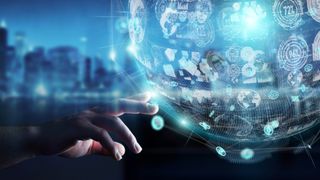
Technologies like Artificial Intelligence (AI), Machine Learning (ML) and Blockchain will have a significant impact on work in the next decade and beyond. But if you believe the sci-fi hype or get bogged down in the technology, it can be difficult to relate them to today’s workplaces and jobs.
Rob Lamb, Client Principal & CTO, Global Transformation Office, Dell Technologies.
Here are three everyday examples of their potential, expressed in terms of the business challenge they are addressing or how consumers will experience them. I don’t mean to over simplify – these are powerful tools – but I think their potential shines through best when they’re expressed in their simplest terms.
Geraldine, restaurant owner
What do you imagine the restaurant of the future to look like? Floating tables, rocksteady drone waiters, and a robot chef that cooks everything exactly to each customer’s taste? It’s a nice idea, but one that probably belongs in a sci-fi film.
In reality, restaurant franchises will look much the same in 2030, but their managers’ days will look very different. All the tedious admin tasks they would busy themselves with every Monday – ordering ingredients and supplies, running payroll, bookkeeping, etc. – are now run automatically through a software platform.
That doesn’t just free up their time to come up with ideas for special events that’ll bring more diners to the restaurant, it fundamentally changes the way their branches operate. With the software collecting data every day, over years it builds up a complete picture of the patterns and trends within the business. Using a combination of sales data and cameras in each restaurant, it uses machine learning to work out when different dishes are most in demand and adjust orders with local suppliers accordingly.
As a result, Geraldine never has to tell a customer they can’t have a particular dish because they’ve run out of tofu, but neither is she having to throw away ingredients that have gone unused at the end of the week that have gone off.
With the help of these new technologies, restaurants, bars and cafes will be able to cut down significantly on one of their biggest and most avoidable expenses: waste.
Are you a pro? Subscribe to our newsletter
Sign up to the TechRadar Pro newsletter to get all the top news, opinion, features and guidance your business needs to succeed!
Lydia, hiring manager
Recruitment is a data-driven business and often involves HR software – but one that has a crucial human element involved too. Having whittled down the applicants to a core group of those most qualified for the role, the phone or face-to-face interview stage can begin.
The problem with this process isn’t just that it’s hugely time-consuming, it’s that all kinds of unconscious biases can creep in, potentially even into the job advert. These issues can be eradicated with the use of AI, which can vet ads for gendered language, sort through applicants and pick out the most suitable ones in a fraction of the time it would take an HR professional or any other human being.
Simulations and VR spaces can also be used to assess how candidates work with others and whether they’re suited to the existing workplace culture. And because everything’s virtual, age, gender and other personal characteristics that could potentially swing a decision unfairly remain hidden until the best applicant has been chosen and they’re offered the job.
Provided the algorithms are written correctly, AI will be key to organisations addressing issues around diversity and inclusion in the workplace.
Kelechi, entrepreneur
Ever had a great idea for a business but were put off by all the hoops you’d have to jump through to get it off the ground?
Kelechi felt like that until he realized how easy technology had made it. The one-day process starts with a smile flashed at his smartwatch, which authenticates his identity and allows him to register the company name with the public blockchain ledger, automatically pulling in personal information and saving him the hassle of filling in tedious business registration forms. That begins a chain reaction that automatically pays the tax registration and creates a business bank account with an initial deposit.
Where does that money come from? A peer-to-peer investing platform that allows users to pledge money towards an entrepreneur’s next big idea, so his business already has backing from the very beginning – all it needs to do is satisfy the published criteria. And just like that, it’s a bonafide start-up.
Compared to the old way, which put barriers such as credit checks, references, tax forms, lawyers, finding investors and lots and lots of waiting in the way, the introduction of blockchain, AI and 5G networks will make starting a business simpler than ever.
These tangible examples should give an indication of how our lives will be shaped in the not-too-distant future and how we can be prepared for them for when they do. Far from the sci-fi clichés, tools like AI, ML, IoT and Blockchain will change work and workplaces in meaningful ways that will increase productivity and make for more fulfilling and connected work and consumer experiences.
- We've featured the best business apps and productivity tools.
Rob is the Client Principal and Chief Technology Officer (CTO) for Dell Technologies in the UK and Ireland. His role is to assist customers with technology driven business change and accelerate their transformation across four key pillars (Infrastructure, applications, workplace and security); while balancing the need for consistent delivery to ensure the desired business outcomes are achieved.

Intel unveils flurry of new Arc GPUs — however serious graphics users will have to wait for more powerful models, as these focus on a completely different and more lucrative market

WD launches enormous 4TB SD card for creative pros — smashes world record for largest removable memory card to smithereens at twice the capacity of biggest microSD cards
Most Popular





